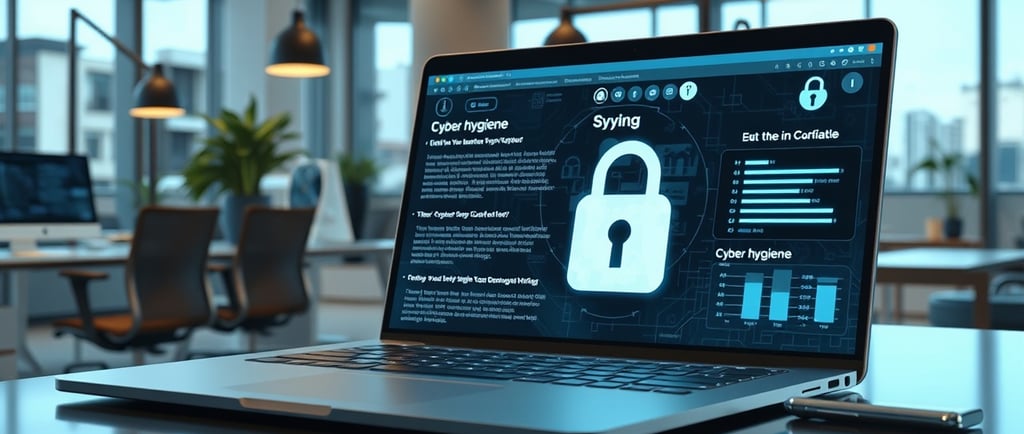The Importance of Cyber Hygiene
Best Cyber Hygiene Practices for Individuals and Organizations
ETHICAL HACKING & CYBER SECURITY
Shreyash Shukla
11/24/20243 min read


Introduction to Cyber Hygiene
With our lives becoming more digital, it's essential to practice good cyber hygiene to protect ourselves from online threats. Let's explore what cyber hygiene is and why it's important.
Defining Cyber Hygiene
Think of cyber hygiene like brushing your teeth, but for your digital life. It involves habits and practices that keep your online activities, devices, and personal information safe from cyber threats. Just like physical hygiene keeps you healthy, good cyber hygiene is vital for your digital well-being.
The Evolution of Cyber Threats
Cyber threats have evolved from simple viruses to sophisticated attacks that can harm individuals and organizations. From phishing emails to ransomware, cybercriminals are always finding new ways to exploit vulnerabilities. This makes staying vigilant and practicing good cyber hygiene more important than ever.
Importance of Cyber Hygiene for Individuals
Individuals are the first line of defense against cyber threats. Poor cyber hygiene can lead to serious consequences, affecting personal privacy and security.
Risks of Poor Cyber Hygiene
Ignoring cyber hygiene can make you vulnerable to identity theft, financial fraud, and other cybercrimes. Unauthorized access to personal accounts and data breaches are just some of the risks that can have lasting impacts.
Impact on Personal Privacy and Security
Good cyber hygiene protects your personal information and safeguards your privacy and security online. By following best practices and staying informed about potential threats, you can reduce the risk of cyber attacks and data breaches.
Importance of Cyber Hygiene for Organizations
For businesses, the stakes are even higher. Neglecting cybersecurity can lead to financial losses, reputational damage, and legal issues.
Financial and Reputational Risks for Businesses
A data breach or cyber attack can be devastating, causing financial losses, damaging reputation, and losing customer trust. Investing in strong cyber hygiene practices is essential to protect sensitive data and maintain stakeholder trust.
Legal and Compliance Implications
Non-compliance with data protection regulations can lead to legal consequences for organizations. Failing to meet cybersecurity standards can result in hefty fines and legal actions, making it crucial for businesses to prioritize cyber hygiene.
Best Practices for Individuals
Understanding the importance of cyber hygiene, here are some best practices for individuals to enhance online security and protect their digital footprint.
Strong Password Management
Create unique, complex passwords for each account and use a password manager to store them securely. Avoid easily guessable information and consider enabling two-factor authentication for added security.
Regular Software Updates
Keep your devices and applications updated with the latest security patches. Cybercriminals often exploit vulnerabilities in outdated software, so staying current with updates is essential.
Best Practices for Organizations
Educate employees about cyber threats and best practices. From phishing scams to password security, informed staff are a strong defense against cyber attacks.
Implement robust network security measures like encryption, access controls, and regular security audits to protect sensitive data and prevent unauthorized access.
Implementing a Cyber Hygiene Program
Creating a Cyber Hygiene Policy
Establish a clear policy outlining the dos and don'ts of cyber hygiene. This should cover password management, data protection, and incident response protocols.
Monitoring and Evaluation
Regularly monitor and evaluate your cyber hygiene practices to ensure your security measures are effective. Continuous assessment helps identify vulnerabilities and areas for improvement.
Cyber Hygiene Tools and Resources
Install reliable antivirus software and firewalls to defend against malware and unauthorized access. Regular updates ensure these tools can combat evolving threats.
Use cybersecurity training platforms to educate employees on the latest threats and best practices. Interactive training modules can help staff recognize and respond to security risks effectively.
Conclusion and Future Trends in Cyber Hygiene
Maintaining good cyber hygiene is essential in today's digital landscape. As technology evolves, staying ahead of cyber threats requires continuous education, proactive measures, and a commitment to cybersecurity. Embracing trends like AI-driven security solutions and blockchain technology can further enhance cyber hygiene efforts. Remember, a little cyber soap and water can keep your digital life clean and secure!
Social Info
Empowering organizations with comprehensive security solutions.
For support and queries
Made with ♡ © 2025. All rights reserved.
